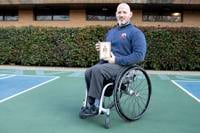
A 2.4-mile swim, 112-mile bike ride and 26.2-mile run stood between wheelchair athlete Tyler Garner and the finish line of the Ironman California triathlon.
“I wasn’t going to allow myself to quit,” Garner said. “I wasn’t even going to entertain that thought. I was either going to finish or I was going to be pulled off the course.”
Garner, kinesiology clinical assistant professor, is well-versed in the sport of triathlons, having completed the half-ironman in 2017 and attempted the full one in 2019. After 10 months of training, he was recently able to complete the full course.
“I tried [the last full marathon] and wasn’t able to finish so the drive to make up for that and to be able to say that ‘I finished it instead of just tried it’ was my motivator,” he said.
With only a few courses being handcycle approved, Garner said his options were limited. He considered Ironman California a good fit after hearing how accessible it was for wheelchair athletes.
The course features a downriver swim, a flat bike trail and a flat two-loop run, which were more difficult due to the six hours of rain on the day of the event.
Alicia Garner, Tyler Garner’s wife and administrative assistant for Counseling and Psychological Services, said she worried about the conditions that day since wheelchair athletes have additional concerns that able-bodied athletes don’t.
“Running through a puddle as an able-bodied athlete might be a slight annoyance but being a wheelchair athlete, that’s all the way up on your wheels and a lot harder,” Alicia Garner said.
Although Tyler Garner has always been physically active, he said he was apprehensive about finishing the bike portion because he never cycled such a long distance.
He said the mindset advantages of being an athlete for most of his life and having a competitive background helped him remain dedicated to his training.
As a full-time teacher, husband and father, Garner said it was hard to fit training into his busy schedule. He sacrificed sleep and free time at work for early morning and lunch-hour training sessions.
Beginning in January, Garner trained everyday for at least two hours during the week and six to eight hours on the weekends. He dedicated his time to a different sport each day, focusing on cycling three times a week since it was his weakest area, he said.
Alicia Garner said she knew the ironman would be a commitment for the whole family because of the time-consuming training regiment.
“It was an experience I’m so happy he was able to do,” she said. “I’m really lucky that we have the opportunities that we do where he could fit that into his schedule, but it did make things a bit difficult at home for sure.”
Although Tyler Garner trained alone, he credits his wife to be a big part of his success. He said he could not have achieved his goals if his wife had not been so supportive of him.
Supporting each other through milestones is nothing new to the Garners. As a family, they have always worked to support each other, Alicia Garner said.
Apart from his wife, Garner received assistance from his father, who acted as his handler during the race and managed his equipment.
He said he was also motivated by others in the wheelchair sports community, having met athletes who had already completed the ironman.
Garner finished the race in 13 hours and four seconds, just four seconds off of his goal. He said he feels excitement and pride when remembering the process, and he also has gratitude for the people who helped him along the way.
Completing the ironman has always been a goal of his and now that he has, he said he hopes to use the experience in the classroom.
As a former wheelchair basketball player for the Movin’ Mavs, Garner said health and fitness have always been a big part of his life. This passion translated to his career in the Kinesiology department, where he teaches exercise and nutrition classes.
Since Garner trained in the Texas heat and competed in California, he had to adjust himself to the different conditions of the competition. This taught him that nutrition is very personalized to the surrounding environment and will rely on this as a personal anecdote during his sports nutrition class, he said.
@alexiadmnz













